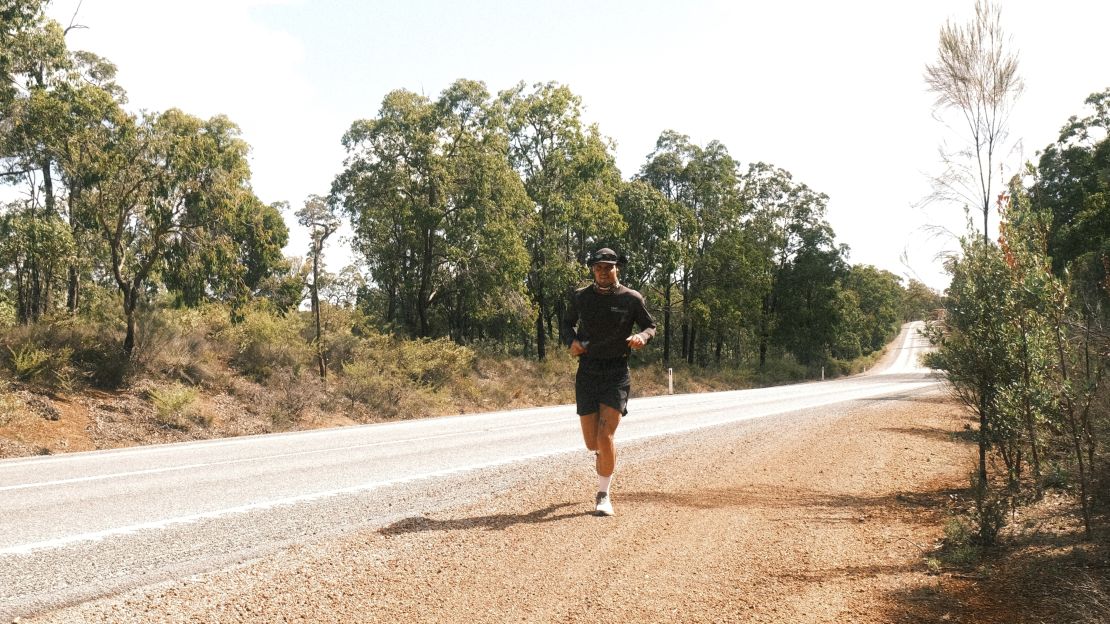British ultrarunner and influencer Will Goodge endured 35 grueling days of hallucinations, injury, and sleep deprivation to run from Perth to Sydney. Covering 2,387 miles—an average of over two and a half marathons per day—Goodge’s trans-Australia feat wasn’t just a physical test, but an emotional tribute to his late mother and a bold statement in the world of ultrarunning.
Running through a nightmare
For the first nine days of his transcontinental challenge, Will Goodge felt trapped in a waking nightmare. His days were consumed by a relentless rhythm of running and refueling, with little sleep and even fewer moments of comfort. At night, hallucinations blurred the line between dreams and reality, his mind struggling to process the trauma his body was enduring. “It felt extremely claustrophobic,” Goodge told CNN. “Even when I was out in the vast expanse of the Australian outback, I felt enclosed. The nights just dragged on.”
Yet on day 10, something shifted. His body, battered but not broken, began to adapt. The daily mileage—around 68 miles—didn’t feel any easier, but it started to feel achievable. His mental fog began to lift. Over the final stretch of his journey, Goodge found himself in rhythm. On May 19, he arrived at Bondi Beach in Sydney to a cheering crowd, completing the 2,387-mile (3,841 km) crossing in just 35 days, likely setting a new record for the fastest crossing of Australia on foot.
Pushing past pain with purpose
Goodge’s run, if ratified, would break the previous record of 39 days, 8 hours, and 1 minute held by Chris Turnbull. But for the 31-year-old, this was never just about the numbers. He ran in memory of his mother, who passed away from Non-Hodgkin lymphoma in 2018. “Seeing her fight cancer the way she did… I have an ignorance to my own suffering,” Goodge said. “When things got tough, I thought about her. That gave me perspective and strength.”

Each day began at 4 a.m. with a simple breakfast—cereal and black coffee—followed by massages and strapping for his bruised and battered feet. His runs were broken into seven-mile blocks, punctuated with calorie-rich meals: smoothies, pasta, cake, sandwiches, and yogurt. After clocking in over 68 miles daily, he’d eat with his crew and occasionally unwind with a beer—a small nod to normalcy amid the madness. “It adds a layer of humanity to an otherwise insane process,” Goodge explained. “If you ran over 100 kilometers in a day, you’d probably want a beer, too.”
A body broken, a mind unyielding
Despite his upbeat tone, the toll was severe. Blisters, a swollen Achilles, shin pain, and extreme weight loss—over 10 kilograms (22 pounds)—pushed Goodge to his limits. His feet were still swollen days after finishing, but not once did he consider quitting. “It’s more mental than physical,” he said. “Your body’s always going to fail doing something like this. But I never gave myself a choice to stop.”
A former rugby player and model, Goodge doesn’t fit the stereotypical mold of an ultrarunner. He’s more muscular, more polished, and significantly more public—his 254,000 Instagram followers get regular updates from exotic locations and endurance feats alike. Previous challenges include running across the U.S., circling Italy’s Lake Como, and crossing the U.K. from Land’s End to John o’Groats. Still, some in the ultrarunning world have questioned the legitimacy of his performances.
Deflecting doubts and defining his path
Goodge has faced skepticism, especially surrounding his heart-rate data and seemingly superhuman pacing. The most vocal critic, runner and writer Will Cockerell, even traveled to the U.S. during Goodge’s trans-America run to investigate. Cockerell suspected “watch muling”—sharing GPS devices among team members—but found no evidence of cheating. Goodge, hurt but defiant, stands by his integrity. “It disgusts me that people would think I’d use my mom’s death to cheat or gain fame,” he said. “I don’t fit in the ultrarunner box—and I’m okay with that.”
Critics also point to his race results, which so far lag behind his solo challenge accomplishments. His best finish to date is 11th place in the Moab 240, a brutal 240-mile race in Utah. But Goodge believes his best is yet to come. “I’m a better athlete now,” he said. “Maybe I can chase podiums in proper race formats—not just records. I want to prove I’m not just a guy who runs across countries, but a serious contender.”
What’s next for the record chaser?
Though no massive projects are currently on his calendar, Goodge is considering a team event in Iceland later this year. For now, his focus is on rest, recovery, and submitting documentation to Guinness World Records—signed witness statements and GPS data via Strava—to confirm his trans-Australia run as the fastest ever recorded.
Regardless of what’s next, one thing is clear: his mother’s memory will continue to drive him. “In these things, the connection with her feels really deep,” Goodge said. “It’s probably why I keep going back and doing more.” He may not look like a traditional ultrarunner. He may not act like one. But Will Goodge is redefining what endurance can look like—and making it deeply, unapologetically personal.






